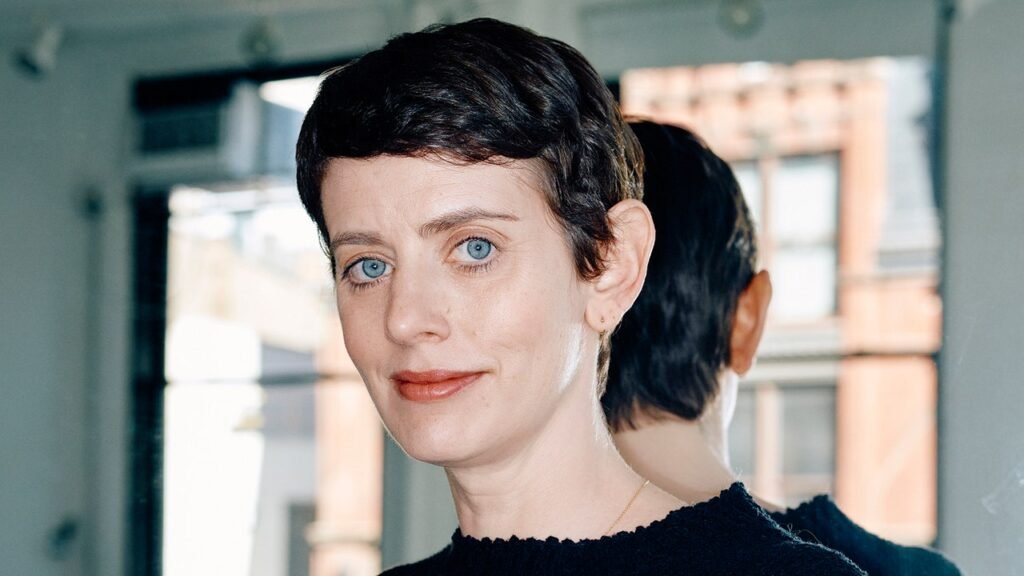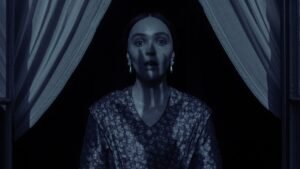Amy Herzog Needs You to Enter Into the Strangeness of Caregiving

A baby we can not see is at risk. We hear the beeping of medical screens. We hear his nurse say, with sudden sharpness, “I don’t like this.” We hear his mom’s voice, threading by the noise, rising above it, as she tries to evoke him, asks him to stick with her. Somebody—a customer—runs to discover a cellphone to name an ambulance. She can not discover the cellphone, she nearly drops the cellphone—what’s the deal with once more?
It was at this level that the girl sitting subsequent to me, within the viewers, coated her eyes.
The episode lasts mere minutes. It’s fully overheard, and I don’t assume I’ve ever felt such rigidity in a theatre earlier than—a rigidity that ripples with the sudden, stunning twists of language and feeling distinctive of the playwright Amy Herzog. The brand new manufacturing of her play “Mary Jane,” directed by Anne Kauffman, just lately opened on the Manhattan Theatre Membership’s Samuel J. Friedman Theatre. (It had its Off Broadway début, additionally directed by Kauffman, in 2017.) The one-act play begins in a one-bedroom condominium in Queens, wherein a single mom, Mary Jane (an excellent Rachel McAdams), cares for her two-year-old son, Alex, who was born with critical medical situations, together with cerebral palsy. We by no means see the kid; he’s recognized to us by the beeping of the machines within the condominium’s bed room, the suctioning sounds of his airway being cleared—and, above all, by the love, by the care, by the element with which he’s mentioned by his mom and his nurse (April Matthis). (“He gave me that look,” the nurse says to Mary Jane, who chuckles in recognition.)
Three blocks north, at Circle within the Sq. Theatre, Herzog has one other play this season, her adaptation of Henrik Ibsen’s “An Enemy of the Folks,” from 1882. Directed by her husband, Sam Gold, the play is helmed by “Succession” ’s Jeremy Robust as a heroic, a lot monologuing whistle-blower in a small city threatened by environmental disaster. (It’s Herzog’s second adaptation of Ibsen; she made her Broadway début final yr, with the acclaimed revival of “A Doll’s Home,” starring Jessica Chastain.)
If “An Enemy of the Folks” is, as Herzog describes it, “males arguing about politics,” “Mary Jane” incorporates a small, all-female solid quietly and collaboratively going in regards to the enterprise of survival. Every actor, save McAdams, has a twin position. A nurse reappears as a physician within the second act. A younger girl, reeling from her new child’s analysis, comes again as a seasoned mom of a sick little one, a veteran of lengthy hospital stays.
Herzog’s profession within the theatre started as an actor, and she or he writes delicately shaded roles, by no means extra so than on this play, with this specific heroine, Mary Jane, a Job-like determine who meets every loss, every intensification of her struggling, with a corresponding intensification of her personal openness to the world, an enigmatic, nearly defiant gentleness and attentiveness to these she encounters.
Kauffman, a frequent collaborator, has referred to as Herzog “an inexhaustible excavator.” Her performs usually pluck from life, from household historical past. “After the Revolution” (2010) and “4000 Miles,” (2011), a finalist for a Pulitzer Prize, each adopted a personality carefully modelled on her grandmother, who was an ardent Greenwich Village lefty. “Mary Jane” is even nearer to the bone. Herzog wrote the play whereas within the thick of caring for her elder daughter, who was born with a uncommon muscular illness referred to as nemaline myopathy. She died final yr, at age eleven. What Herzog brings to the stage is the richness of the connection inside the household but additionally inside a bigger constellation of caregivers. The conversations with medical doctors and nurses are rendered with piercing specificity.
Herzog and I spoke twice, on the cellphone and as soon as, in particular person, at her native café. It might have been my native café—it was scarcely ten minutes from the place I’ve lived for almost 20 years. However I had by no means been there. To get there I took a left flip the place I’d have ordinarily walked proper, and located myself someplace deeply acquainted and completely unknown.
Our conversations have been edited and condensed for readability.
I wish to begin with what I feel is my favourite second within the play. Mary Jane is on the hospital, with Alex. She meets one other mom—an Orthodox Jewish girl named Chaya—who can be watching over her sick little one. The youngsters are sleeping, so the ladies have time to speak. Chaya says one thing like “I don’t know if I can describe it.” And Mary Jane type of shifts in her chair, she strikes her physique so she’s dealing with Chaya, and what does she say?
“Positive you’ll be able to.”
“Positive you’ll be able to.” It’s tempting to think about this dialogue occurring within the thoughts of the playwright: I can’t describe this. Positive, you’ll be able to. Are you able to inform me slightly bit about early days of penning this play, of pondering your approach into it—did it really feel like there was some sort of resistance that needed to be breached, some sort of reluctance?
Sure. A part of it was fascinated with God and the way embarrassing it’s to do this in entrance of different individuals, but additionally writing about having a sick little one—to me, a nuclear topic, within the sense of whether or not you’ll be able to keep away from sentimentality and keep away from the traps of that style, and whether or not there’s any technique to combat the viewers’s expectation of what that can be.
The sentimental, the therapeutic—all these genres that we’re not supposed to the touch. However you would need to push a few of that worry apart simply to see what comes; you would need to danger sentimentality, I’d assume.
You do. I additionally tried to strategy every certainly one of these scenes sideways. I feel that has been true in all my performs to some extent, however on this one I wanted a proper experiment to make me really feel like I’m doing one thing aside from getting into into this terrifying, doubtlessly sentimental topic. And the experiment was: Can I bleed battle out of this play nearly fully? Can the scenes between all these girls not likely contain battle? I imply, there’s battle with the skin world, with the paperwork, with the medical system, with God, however not likely with one another.
There are not any antagonists on this play.
There are offstage antagonists, however no onstage antagonists on this play. The closest factor is the music therapist who’s elusive however does lastly flip up. And that to me helped me really feel like there’s an mental challenge that is sort of a cowl for all the opposite stuff.
I had a powerful feeling whereas I used to be watching the play—though “watching” abruptly feels very fallacious, I felt contained in the play, or by some means with the play—I had a way that you just didn’t need me to only really feel. I had a way you wished one thing else from me. You had another design, one thing for me to apprehend.






